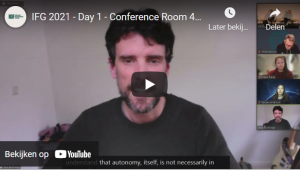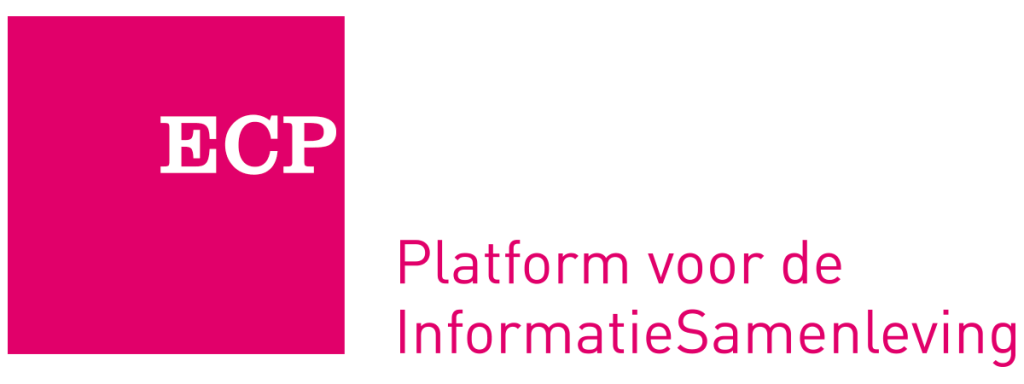Datum: dinsdag 7 december 2021
Deze bijeenkomst heeft plaatsgevonden in het Engels. Hieronder kunt u de Engelstalige bijeenkomst terugkijken en het Engelstalige verslag lezen.
The risks of pursuing digital autonomy

Organised by the Netherlands Internet Governance Forum (NL IGF) and the Dutch organisation ECP | Platform for the Information Society, this workshop addressed the notion of digital autonomy and the risks it creates for balancing national interests with preserving a global internet. Recent focus at the policy level on concepts such as digital sovereignty and digital autonomy has indeed raised fears that this pattern could lead to a splinternet. Moderated by Olaf Kolkman (Senior Advisor, Internet Society), this session proposed to explore what would be the implications and day-to-day risks of pursuing digital autonomy on a national and/or regional level.
Though increasingly a feature of Internet governance discussions, digital autonomy and digital sovereignty are controversial notions. As they do not convey the same meaning for all actors, it is important to clarify their definition before assessing their potential risks. Nadia Tjahja (PhD Researcher, UNU-CRIS) argued that framing discussions in terms of digital sovereignty often leads to thinking with a binary approach, pitting independence against the forms of interdependence on which the Internet relies. Also, the notion of digital sovereignty is state-centric and thus ill-suited to address the multi-faceted challenges faced by internet users.
Digital autonomy, on the contrary, is the right to make informed decisions, and thus more related to the individual level. Chris Buckridge (Advisor, RIPE NCC) argued that this notion is not necessarily in conflict with that idea of a global internet, since the internet relies on the interoperability of autonomous systems, and enhancing autonomy does not necessarily require more regulations and state control.
Lousewies van der Laan (Executive Director, Transparency International Netherlands) agreed that autonomy is a concept that can translate into a plurality of practices. For instance, it can cover both the issue of how individuals can make informed choices in relation to digital aspects of their life, as well as challenges at the policy level. From a consumer perspective, van der Laan supported the emergence of ‘personal digital autonomy’, which would derive from an improved knowledge of Internet users on how these technologies function.
Moving to the policy level, participants also discussed the role of states and governments in guaranteeing ‘digital autonomy’. Roelof Meijer (CEO, SIDN) detailed that various actors, including the EU, intend to enhance their ‘strategic digital autonomy’, to have the possibility to decide on digital issues considered as strategically important. For critical resources service providers, such as Stichting Internet Domeinregistratie Nederland (SIDN), in charge of the management of a country code top level domain (ccTLD), the ability to choose between different options and avoid lock-ins or single points of failure is indeed very important.
Gergana Petrova (External Relations Officer, RIPE NCC) explained that, since Internet Governance mechanisms departed from traditional decision making centralised settings, there is a clear challenge posed by the increasing attempts of national governments to shape internet related issues through national and regional policies.
As the EU is due to release its new Declaration of Digital Principles, there is a need to ensure that EU authorities further their commitment to a globally interoperable and unfragmented Internet. Van der Laan agreed that more and more state actors are attempting to get greater control over the technical layer of the internet, characterising this pattern as an extremely dangerous development.
Buckridge argued in particular that the recent negotiations on the reform of the NIS directive at the European level could soon extend regulatory obligations to root server operators of the internet. This legislative text could have a negative effect for the stability of the internet, especially as other states may follow suit. Petrova additionally explained that international sanctions could also restrict the use of internet resources in certain countries and RIPE NCC investigates the possibility of getting an exemption for internet resources from EU sanction regulations.
On the other hand, Meijer underlined the fact that the behaviour of a number of corporate actors required action from public authorities, and thus partly triggered this trend of states’ engagement with internet policy arenas. Underlying that state actors are not the only stakeholders able to favour digital autonomy, Tjahja referred to various technological developments in the Netherlands related to ‘self-sovereign identity’. SURF for instance has developed a blockchain-based verifiable data registry, in which users become the owners of their personal data and determine what information they share and with whom. Such technology could become useful in providing new ways for individuals to protect their information and provide more decision making power in relation to the data they share online.
Lousewies van der Laan concluded by stressing the importance of keeping these types of discussions, including this workshop on digital autonomy, at the IGF, as the Internet Governance Forum provides an open and transparent forum that fosters a multistakeholder debate.
This session report is based on the report written by Clement Perarnaud, published by Digital Watch observatory, Geneva Internet Platform.
